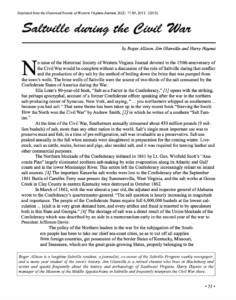Saltville During the Civil War: Industrial Power, Battlefield Memory, Enduring Legacy
Authors: Roger Allison, Jim Glanville & Harry Haynes
Published: 2013 (Historical Society of Western Virginia Journal) | Archive Download For Free Below
📎 Opens in a new tab — use “Save As” to download.
📜 Part of the Holstonia.co Knowledge Base. Redistribution not permitted.
Overview
During the Civil War, Saltville produced over two-thirds of the Confederacy’s salt supply—a vital resource for food preservation, leather tanning, and military logistics. Its strategic importance made it a military target, culminating in two fierce battles.
Salt as Strategy
The article explores Saltville’s industrial might, from brine boiling techniques to railroad logistics. Historical maps and images reveal the scope of the salt works and its role in sustaining the Confederate war effort.
Battles & Atrocity
Two 1864 battles brought war directly to Saltville. The first battle repelled Union forces but led to the Saltville Massacre, a post-battle atrocity against wounded Black soldiers. The second battle resulted in Union destruction of key saltworks.
Legacy
Today, Saltville’s Civil War history anchors tourism, battlefield preservation, and historical memory. This archive serves as a vital portal for understanding the industrial, military, and human complexities of the era.
Thank you for honoring what was nearly lost. Your awareness matters more than you know.
↳ Explore More Archives

